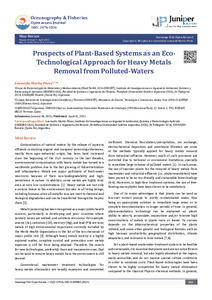Por favor, use este identificador para citar o enlazar este ítem:
https://repositorio.uca.edu.ar/handle/123456789/14113| Campo DC | Valor | Lengua/Idioma |
|---|---|---|
| dc.contributor.author | Pérez, Leonardo Martín | es |
| dc.date.accessioned | 2022-06-07T13:22:02Z | - |
| dc.date.available | 2022-06-07T13:22:02Z | - |
| dc.date.issued | 2021 | - |
| dc.identifier.citation | Pérez, L. M. Prospects of plant-based systems as an ecotechnological approach for heavy metals removal from polluted-waters [en línea]. Oceanography & fisheries open access journal. 2021, 13 (3). doi: 10.19080/OFOAJ.2021.13.555863. Disponible en: https://repositorio.uca.edu.ar/handle/123456789/14113 | es |
| dc.identifier.issn | 2476-0536 | - |
| dc.identifier.uri | https://repositorio.uca.edu.ar/handle/123456789/14113 | - |
| dc.description.abstract | Contamination of natural waters by the release of aqueous effluents containing organic and inorganic poisoning substances, mostly from agro-industrial origin, has been hard increased since the beginning of the 21st century. In the last decades, environmental contamination with heavy metals has turned to a worldwide problem due to the fast growing of industrialization and urbanization. Metals are major pollutants of fresh-water reservoirs because of their non-biodegradability and highpersistence in nature. In addition, some metals are highly toxic even at very low concentrations [1]. Heavy metals are not only a serious threat to the environment but also to all living beings, including humans, since all metallic ions are inert to chemical and biological degradation and can be transferred through the trophic chain [2]. Metal’s poisoning has been recognized as a major public health concern, particularly in developing and poor countries where sanitary issues are wicked, and solutions are scarce. For example, arsenic (As), cadmium (Cd), mercury (Hg), and lead (Pb) are toxic metals of high environmental importance currently included by the World Health Organization in the list of the ten chemicals of major public risk [3]. Although heavy metals toxicity is a highly explored matter, complete control and prevention over metals exposure is still far from being attained. Therefore, the search for new technologies, preferably clean and inexpensive ones, that can be used to remove heavy metals from the environment is still desired... | es |
| dc.format | application/pdf | es |
| dc.language.iso | eng | es |
| dc.publisher | Juniper Publishers | es |
| dc.rights | Acceso abierto | * |
| dc.rights.uri | http://creativecommons.org/licenses/by-nc-sa/4.0/ | * |
| dc.source | Oceanography & fisheries open access journal Vol.13, No. 3, 2021 | es |
| dc.subject | CONTAMINACION DEL AGUA | es |
| dc.subject | CONTAMINACION AMBIENTAL | es |
| dc.subject | PROTECCION DEL MEDIO AMBIENTE | es |
| dc.subject | TRATAMIENTO DE AGUAS RESIDUALES | es |
| dc.subject | PLANTAS | es |
| dc.subject | ECOTECNOLOGIA | es |
| dc.title | Prospects of plant-based systems as an ecotechnological approach for heavy metals removal from polluted-waters | es |
| dc.type | Artículo | es |
| dc.identifier.doi | 10.19080/OFOAJ.2021.13.555863 | - |
| uca.disciplina | INGENIERIA AMBIENTAL | es |
| uca.issnrd | 1 | es |
| uca.affiliation | Fil: Pérez, Leonardo Martín. Pontificia Universidad Católica Argentina. Consejo Nacional de Investigaciones Científicas y Técnicas. Grupo de Biotecnología de Materiales y Medioambiente; Argentina | es |
| uca.affiliation | Fil: Pérez, Leonardo Martín. Pontificia Universidad Católica Argentina. Instituto de Investigaciones en Ingeniería Ambiental, Química y Biotecnología Aplicada; Argentina | es |
| uca.affiliation | Fil: Pérez, Leonardo Martín. Pontificia Universidad Católica Argentina. Facultad de Química e Ingeniería del Rosario; Argentina | es |
| uca.affiliation | Fil: Pérez, Leonardo Martín. Ministerio de Ciencia, Tecnología e Innovación. Consejo Nacional de Investigaciones Científicas y Técnicas; Argentina | es |
| uca.affiliation | Fil: Pérez, Leonardo Martín. Cátedra Organización de las Naciones Unidas para la Educación, la Ciencia y la Cultura de sostenibilidad; Argentina | es |
| uca.affiliation | Fil: Pérez, Leonardo Martín. Universitat Politècnica de Catalunya; España | es |
| uca.version | publishedVersion | es |
| item.grantfulltext | open | - |
| item.fulltext | With Fulltext | - |
| item.languageiso639-1 | en | - |
| crisitem.author.dept | Facultad de Química e Ingeniería del Rosario | - |
| crisitem.author.dept | Instituto de Investigaciones en Ingeniería Ambiental, Química y Biotecnología Aplicada (INGEBIO) | - |
| crisitem.author.orcid | 0000-0002-4125-3536 | - |
| crisitem.author.parentorg | Pontificia Universidad Católica Argentina | - |
| crisitem.author.parentorg | Facultad de Química e Ingeniería del Rosario | - |
| Aparece en las colecciones: | Artículos | |
Ficheros en este ítem:
| Fichero | Descripción | Tamaño | Formato | |
|---|---|---|---|---|
| prospects-plant-based-systems.pdf | 345,01 kB | Adobe PDF |  Visualizar/Abrir |
Visualizaciones de página(s)
56
comprobado en 27-abr-2024
Descarga(s)
23
comprobado en 27-abr-2024
Google ScholarTM
Ver en Google Scholar
Altmetric
Altmetric
Este ítem está sujeto a una Licencia Creative Commons

